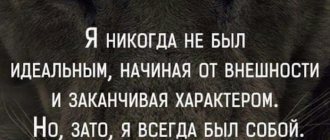Winged expressions from Russian folk tales with explanations
Accurate, capacious in meaning, often brief “winged words” received a second, eternal life. A second life, because the first life was given to them by the people in the person of its best representatives - outstanding philosophers, writers, scientists, publicists, statesmen of different eras and peoples.
A second life was given to them by the wisdom of a person who appreciated them. These sparks of the human mind fly from century to century as if on wings, decorating our lives.
Witty people use winged words in conversation; they give them great intellectual pleasure. They are used by writers in their works, speakers, and artists in their performances.
Winged words express the essence of rather complex phenomena of life with jeweler precision.
The accuracy, capacity, and brevity of popular words are convenient when used in any area of human life. Their meaning is quite clear for application in all layers of society.
Sometimes it is difficult to determine whether this catchword originally belonged to the author, and then passed into our lives, or, conversely, the author took it from colloquial speech. Cultures of different eras and peoples have enriched the stock of catchwords. He is still enriching himself to this day.
Our dictionary contains the catchwords themselves, their meaning, in which they are used, by which author and in which literary monument they are found in our time.
Some catchwords that have entered literary speech have acquired a new meaning that is not inherent in their original source. Thus, expressions that came from biblical myths, folk songs, and fairy tales acquired a different semantic coloring.
We hope that this book will be useful, that the reader will appreciate and pay tribute to the collected precious scatterings of wisdom of winged words.
And Vaska listens and eats
Appeared in the fable of I.A. Krylov “The Cat and the Cook” in 1813. Now it has an ironic meaning: when one says something, and the other minds his own business and does not pay attention to his words.
And in the forehead the star is burning
Phrase from “The Tale of Tsar Saltan, of his glorious and mighty hero Prince Gvidon Saltanovich and the beautiful Swan Princess” (1831) by A.S. Pushkin. Referred to the characterization of the Swan Princess, but now in a humorous form it speaks of an intelligent, educated person.
But still she spins
It is believed that this phrase belongs to the great Italian scientist Galileo Galilei (1564–1642), while he was in the dungeons of the Inquisition. He was accused of adhering to the heretical teaching of Copernicus about the movement of the Earth around the Sun, and he was forced, on his knees, to swear that he renounced the heresy. According to legend, Galileo, rising from his knees, said: “Eppur si muove” (“Still she is spinning”).
And you, friends, no matter how you sit down, are still not fit to be musicians.
A line from a fable by I.A. Krylov “Quartet” (1811). It is said ironically about people trying to do something for which they are completely unsuited.
A phrase from a fairy tale by G.K. Andersen "The King's New Clothes" Two rogues, posing as weavers, undertook to weave for one king such fabric that supposedly only an intelligent person worthy of the position he occupies could see. Pretending that they had worked hard, the rogues handed the customer “nothing,” empty space instead of fabric.
What are the magic words and spells in fairy tales, books, films?
Do you remember? Many even repeated them while playing in the yard) But someone didn’t pay attention. but in vain)
Kribli, crabble, booms (From the fairy tale “The Snow Queen” by Evgeny Schwartz, 1938) A storyteller’s spell from the fairy tale play “The Snow Queen” (1938), written by Soviet playwright Evgeny Lvovich Schwartz (1896-1958) based on the fairy tale by Hans Christian Andersen ( 1805-1875) “The Snow Queen”. There is no such spell in the work of the Danish writer. The phrase is a symbol of an ongoing miracle, magic, magical transformation (joking).
Conjure my shoes! Evil winds blow and blow. ... (The evil sorceress Gingema in the cartoon “The Wizard of Oz”)
Tear, break, destroy! Knock over houses, lift them into the air! Susaka, masaka, lema, rema, gema. Burido, furido, sema, pema, fema! (The Evil Witch Gingema in the book “The Wizard of Oz”)
Bambara, chufara, loriki, yoriki, pikapu, trikapu, skoriki, moriki! Appear before me, flying monkeys. (Evil sorceress Bastinda, “The Wizard of the Emerald City”)
Assara-dara-chukkara (The fairy tale film is called “The Seventh Genie”)
Abra-shvAbra-kadAbra (film “The Adventures of Baron Munchausen”)
Krex-fex-pex (From the fairy tale “Pinocchio”) If anyone has forgotten where this quote comes from, let us remind you. Pinocchio, succumbing to persuasion in a place known as the Country of Fools, buried his only gold piece in the hope that the next day a tree would grow there and instead of leaves there would be gold ducats on it. He buried the gold and repeated it like a spell: krex, pex, fex.
At the command of the pike, at my will... (Russian folk tale “At the command of the pike”)
Fuck-tibidoh-tibidoh! (In the 16th issue of the cartoon “Well, wait a minute!”) The wolf, who has lost consciousness due to sunstroke, falls into the hands of a bottle, from which smoke comes out and a Hare with a beard appears, dressed in a turban, a robe and characteristic shoes. To the Wolf’s surprised exclamation “Hare?!” he replies: “Hare, Hare! Abdurrahman ibn Hottab! The Wolf threateningly says to the Hare: “Well, Hare”... He pulls out the hairs from his beard and casts the spell “Fuck-tibidoh-tibidoh!”, as a result of which the Wolf decreases in size and ends up in the same bottle. The bottle is caught in a seine by an old man who dreams of catching a goldfish. Seeing the Wolf emerging from the bottle, the old man is taken aback, but he, having torn a hair out of the old man’s beard, pronounces the spell “Fuck-tibidoh-tibidoh!”, and a palace appears in place of the dilapidated hut. At the very end of the film, the old man catches the Wolf again and asks him to change the old woman to a pretty blonde princess. He pulls out a hair from the old man and casts a spell, but the result is somewhat unexpected: in place of the palace, a dilapidated hut has reappeared, and in front of it, of course, is a broken trough.
Eni Beni Raba (film “Topsy-Turvy”, 1981) An animated film about an imp who could NOT do dirty tricks. The spell “Eni Beni Raba” is cast when you need to do a minor dirty trick.
You roll, roll, little ring, onto the spring porch, into the summer canopy, into the autumn little house, and along the winter carpet to the New Year's fire! (From the fairy tale by Marshak S.Ya. “Twelve Months”, 1956)
Snur-re, snur-re, snur-re, vips! Turn around as a baby! (Fairy tale “Little Nils Carlson” by Astrid Lindgren)
Trips, traps, trulle, eight holes, five pans! (Children's fairy tale “Secrets of the Old Town”, based on the fairy tale by Dagmar Normet “Zasypayka and his friends”) It turns out that you just have to say “Thrips, traps, trulle, eight holes, five pans”, and any of your wishes will come true, if, of course, you will become friends with Zasypayka. But getting to know him is not so easy - when he is wearing a magic cap, the children do not see him, and when he takes off the cap, the children immediately fall asleep. And so Zasypaika was very sad and dreamed of making friends with someone. And he became friends with the boy Mati and his dog Tups.
Grandma cast a spell, grandfather cast a spell, little gray bear cast a spell! (From childhood) The phrase had to be repeated 3 times. This was a saying, and then they called the action that should be performed, a request or desire. Sometimes it worked when the parents could hear. You also had to make passes with your hands while casting the spell. For mystery and for everything to work.
Everyone wants to go to a fairyland at least once, and especially children. Be real wizards and plunge into the world of magic, fairies and fabulous animals that can take you to a wonderful world. But there’s no way to get there just like that; to do this you need to know special magic spells with the help of which all children’s dreams can come true.
Fairytale phraseological units Part 2
Let's continue our acquaintance with phraseological units that came into use from fairy tales and fables.
And let's start with two famous mythical characters - Baba Yaga and Koshchei the Immortal. In Russian folk tales, Baba Yaga plays the role of an ugly and evil old witch who travels around the world in a mortar and covers her tracks with a broom. Yaga's permanent residence is a hut on chicken legs, standing in a deep forest, which is located in the thirtieth kingdom beyond the Smorodina River.
More often than not, Baba Yaga is an evil fairy-tale character, but sometimes she helps good young people who are strong in spirit, do not show fear of her, and confidently go towards their intended goal.
There is inconstancy in the old woman’s character: she is often at one with Koshchei the Immortal, but, nevertheless, she reveals the secret of his immortality to Ivan Tsarevich.
The duality of Baba Yaga's nature, according to researchers of ancient mythology, is associated with the duties of the priestesses who performed the initiation rite for adolescents. In fairy tales, she puts children on a shovel to fry them and eat them, but they always run away or she herself lets them go. And how many young people she saved, giving them magical attributes that helped them achieve what they wanted!
Nowadays, the subtleties of the image of Baba Yaga are lost and ugly and evil women are named after her. Although, if you look deeper into the human essence, no matter how evil a person is, good qualities glimmer in him and sometimes appear.
Koschey the Immortal - a character from Slavic mythology and fairy tales, appears as an ugly thin old man who loves to steal beauties and jewelry. He is a master of disguise and witchcraft.
Lives where it is always twilight and there is nothing alive. Some researchers believe that the prototype of Koshchei was the pagan god Karachun, the ruler of the Underground Kingdom.
Just as Baba Yaga in modern speech has lost her fairy-tale flavor, so in our time Koshchei the Immortal is called a very thin, tall man. And if we recall the whims of the mythical Koshchei, then only greedy, thin old men who are fond of young girls should be called by his name.
Many author's phraseological units come from the fairy tales of A. S. Pushkin. In addition, his tales contain many phraseological units borrowed from Russian folk tales. Let me recall just a few of them.
The well-known “Tale of the Fisherman and the Fish” gave us such well-known expressions: “at a broken trough”, “golden fish”. Lo and behold, there was a dugout in front of him again; His old woman is sitting on the threshold, and in front of her is a broken trough.
“I was left with nothing,” this is what they say now when, due to greed, lack of a sense of proportion, or arrogance, a person loses what he had or fails. Sometimes they will say ironically about an imaginary, unrealistic prospect: “goldfish.”
In “The Tale of Tsar Saltan,” the queen’s envious sisters characterize the child born to her: “... not a mouse, not a frog, but an unknown little animal.” Nowadays they say this about some absurd-looking creature or about a character in a fictional story.
Phraseologisms came from the same fairy tale: “if only I were a queen...” (thus reminding a person that he is not omnipotent); “a star is burning in the forehead” (this can be said about a pimple or bruise in the middle of the forehead).
Phraseologisms came from the poem “Ruslan and Lyudmila”: “there is a Russian spirit, there is a smell of Russia”; “things of bygone days.” The second expression is used in speech when they want to talk about events that happened a long time ago and have already been forgotten. To this day, the following expressions from “The Tale of the Golden Cockerel” are used: “I, of course, promised, but there is a limit to everything”; “The fairy tale is a lie, but there is a hint in it, a lesson for good fellows.”
Let's look at a few more interesting phraseological units, for example, this one - “pea jester”. For the clowns of Ancient Rome, a mandatory accessory was a bull bladder into which peas were poured. In the Middle Ages, jesters in theaters beat other artists, and sometimes even spectators, with such a rattle.
This tradition reached Rus', and then the buffoons began to decorate themselves with pea straw. This is how the expression “pea buffoon” appeared.
Nowadays, this is what they say about a person of awkward appearance, about his inappropriate, funny behavior, that is, when a person is a laughing stock in the eyes of others. This expression can also have a contemptuous meaning. If, during a serious conversation, one of its participants clowns around excessively or uses irony, then it will be said to him: “What a buffoon!”
The phraseology “frog traveler” came from V. M. Garshin’s fairy tale “Frog Traveler” - this is what they say about an unlucky travel lover who often gets into trouble. Sometimes they can kindly say about a lover of wandering, an elderly but quite mobile woman: “You are our frog traveler.”
An interesting phraseology is “pulling chestnuts out of the fire” - that is, working for the benefit of another, to the detriment of one’s own interests. This expression was first used by the French fabulist Jean Lafont in the fable “The Monkey and the Cat,” in which the Monkey forces the Cat to pull chestnuts from the fire. The monkey eats roasted chestnuts, the cat gets nothing and even burns his paws.
And finally, about a cat who was walking on its own. The expression appeared thanks to the fairy tale of the English writer Kipling “The Cat that Walked by itself.”
In this fairy tale, the cat boasts that, unlike other animals that have been tamed by humans, she is free and walks on her own. But at the same time, she does not refuse the food and shelter that a person gives her.
In modern speech they speak ironically about an individualist who values his freedom and behaves defiantly independently.
Source
Let's go to space and the moon
They say the following words:
“You will go alone to a fairy-tale, kind and colorful world. Just wave your wand and go to the moon.”
In order not to get stuck on the moon, but to be able to return back to Earth after the first, you need to read the second spell:
“The light is bright and big, you are so beautiful, but it’s time for me to go back. Bye, white hill!
Harry Potter. ALL SPELLS from movies and what they mean
Chucky Doll and Nepeta Magic Spell
Magical place
Each adult had his own secluded place in childhood. Most of it was fictional. The children hid in closets and imagined that they were in a completely different place, where it was quiet, calm and incredibly beautiful. We covered ourselves with a blanket and imagined that we had moved to another dimension. Any child can achieve the same with the help of a small spell, which he must learn by heart, otherwise it will not work. You will also need to build a small tent in the apartment from a blanket and chairs.
The words you should learn are:
“I’ll take the magic wand in my hands and take the magic with me. A miracle will fly to me and take us back to the old days, and I’ll wave my magic wand, and very quickly, together with you, miracle, I’ll fly away.”
Many people think that such rituals are not real, but for children this is real magic, with the help of which all their dreams drawn from fairy tales come true.
New Year's magic
One of the most powerful and powerful spells, taken from an ancient book containing a whole set of different magical rituals, sounds like this:
“Cracks, pex, fex! My wish will come true."
There is another way to call Santa Claus, it is very complicated, everything must be done carefully and carefully.
To call Frost, you need to find his drawing in fairy tales, and underline his name in the text, then you need to pour milk into a glass (the glass should be half empty) and put cookies on a plate (preferably, they should be chocolate). You need to put an open book under the tree, along with a glass of milk and a plate of cookies. In this case, you need to repeat the following words:
“Santa Claus, come visit me, I left you some sweets here, I opened a fairy tale for you and I’m always waiting for you. Just come to me, but with a gift. It doesn’t matter what kind, the main thing is that it’s delicious, just like what I prepared for you.”
It is better to present the rules of behavior to a child in a playful way to make it clearer and more accessible. To do this, you can use riddles and games about polite words.
presented below.
Source







